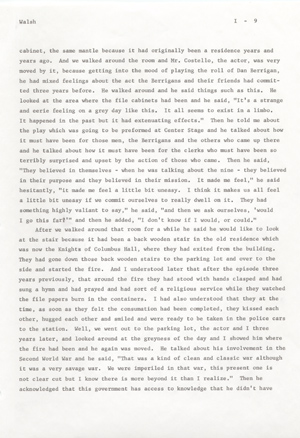 |
The Catonsville Nine's invasion and burning of the Catonsville draft board files: an interview with Jean S. Walsh given on March 30, 1973.
 |
13 / 15 |
 |



| Collection: |
Friends of Catonsville Library |
| Date: |
1973-03-30 |
| Date of Digitization: |
2004-03-31 |
| Source: |
Catonsville Library |
| Original Dimensions: |
28 x 22 cm |
| Creator: |
Walsh, Jean S. |
|
|
Description:
A transcript of a recorded interview with Jean S. Walsh, the editor of Catonsville's local newspaper, the Catonsville Times. She was present at the scene after the burning of draft records in Catonsville on May 17, 1968.
Transcription: cabinet, the same mantle because it had originally been a residence years and
years ago. And we walked around the room and Mr. Costello, the actor, was very
moved by it, because getting into the mood of playing the roll of Dan Berrigan,
he had mixed feelings about the act the Berrigans and their friends had commit-
ted three years before. He walked around and he said things such as this. He
looked at the area where the file cabinets had been and he said, "It's a strange
and eerie feeling on a grey day like this. It all seems to exist in a limbo.
It happened in the past but it had extenuating effects." Then he told me about
the play which was going to be preformed at Center Stage and he talked about how
it must have been for those men, the Berrigans and the others who came up there
and he talked about how it must have been for the clerks who must have been so
terribly surprised and upset by the action of those who came. Then he said,
"They believed in themselves - when he was talking about the nine - they believed
in their purpose and they believed in their mission. It made me feel," he said
hesitantly, "it made me feel a little bit uneasy. I think it makes us all feel
a little bit uneasy if we commit ourselves to really dwell on it. They had
something highly valiant to say," he said, "and then we ask ourselves, 'would
I go this far?'" and then he added, "I don't know if I would, or could."
After we walked around that room for a while he said he would like to look
at the stair because it had been a back wooden stair in the old residence which
was now the Knights of Columbus Hall, where they had exited from the building.
They had gone down those back wooden stairs to the parking lot and over to the
side and started the fire. And I understood later that after the episode three
years previously, that around the fire they had stood with hands clasped and had
sung a hymn and had prayed and had sort of a religious service while they watched
the file papers burn in the containers. I had also understood that they at the
time, as soon as they felt the consumation had been completed, they kissed each
other, hugged each other and smiled and were ready to be taken in the police cars
to the station. Well, we went out to the parking lot, the actor and I three
years later, and looked around at the greyness of the day and I showed him where
the fire had been and he again was moved. He talked about his involvement in the
Second World War and he said, "That was a kind of clean and classic war although
it was a very savage war. We were imperiled in that war, this present one is
not clear cut but I know there is more beyond it than I realize." Then he
acknowledged that this government has access to knowledge that he didn't have
|




